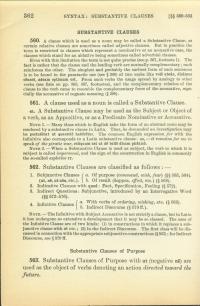560. A clause which is used as a noun may be called a substantive clause, as certain relative clauses are sometimes called adjective clauses. But in practice the term is restricted to clauses which represent a nominative or an accusative case, the clauses which stand for an ablative being sometimes called adverbial clauses.
Even with this limitation the term is not quite precise (see § 567, footnote 1). The fact is rather that the clause and the leading verb are mutually complementary; each reinforces the other. The simplest and probably the earliest form of such sentences is to be found in the paratactic use (see § 268) of two verbs like volō abeās, dīcāmus cēnseō, adeam optimum est. From such verbs the usage spread by analogy to other verbs (see lists on § 563, footnote 1; § 568, footnote 2), and the complementary relation of the clause to the verb came to resemble the complementary force of the accusative, especially the accusative of cognate meaning (§ 390).
561. A clause used as a noun is called a substantive clause. A substantive clause may be used as the subject or object of a verb, as an appositive, or as a predicate nominative or accusative.
Note 1— Many ideas which in English take the form of an abstract noun may be rendered by a substantive clause in Latin. Thus, he demanded an investigation may be postulābat ut quaestiō habērētur. The common English expression for with the infinitive also corresponds to a Latin substantive clause.
It remains for me to speak of the piratic war.
Reliquum est ut dē bellō dīcam pīrāticō.
Note 2— When a substantive clause is used as subject, the verb to which it is subject is called impersonal, and the sign of the construction in English is commonly the so-called expletive IT.
562. Substantive clauses are classified as follows.
- Subjunctive clauses (ut, nē, ut nōn, etc.).
a. Of purpose (command, wish, fear) (§§ 563 - 564).
b. Of result (happen, effect, etc.) (§ 568).
- Indicative clauses with quod: Fact, specification, feeling (§ 572).
- Indirect questions: Subjunctive, introduced by an interrogative word (§§ 573 - 576).
- Infinitive clauses
a. With verbs of ordering, wishing, etc. (§ 563).
b. Indirect discourse (§ 579 ff.).
Note— The Infinitive with subject accusative is not strictly a clause, but in Latin it has undergone so extensive a development that it may be so classed. The uses of the infinitive clause are of two kinds: (1) in constructions in which it replaces a subjunctive clause with ut etc.; (2) in the indirect discourse. The first class will be discussed in connection with the appropriate subjunctive constructions (§ 563); for indirect discourse, see § 579 ff.

